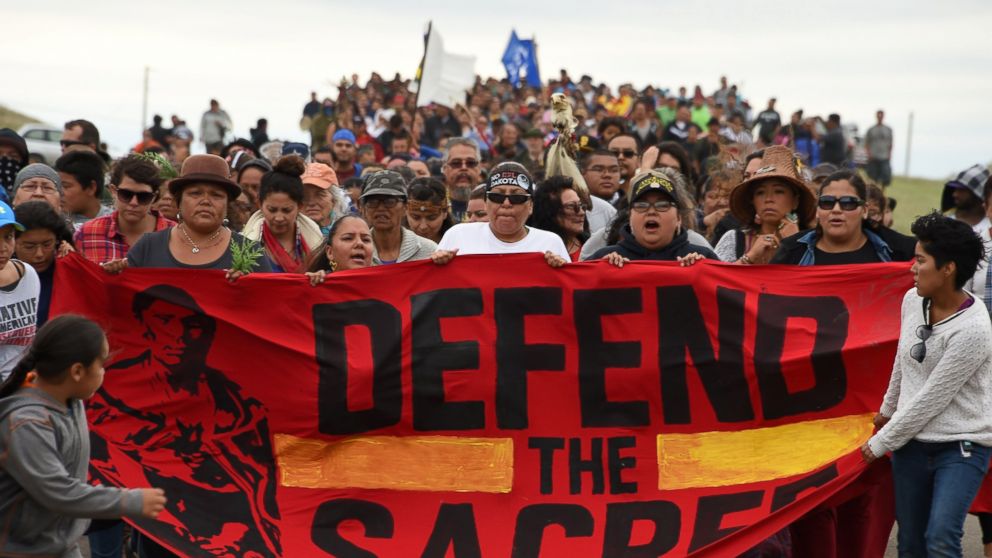Tensions Mount as Native American Tribe Fights to Block Oil Pipeline
— -- A multibillion-dollar pipeline being built through land claimed by Native Americans to be culturally sensitive has sparked outrage, protest and heartbreak among tribe members who say sacred sites are being “bulldozed.”
A judge ordered a temporary halt to construction on part of the 1,172-mile Dakota Access pipeline after tensions between protesters and workers escalated over the weekend. Witnesses say private security workers unleashed pepper spray and pit bulls on a crowd of men, women, and some children who were protesting the pipeline over the weekend. But authorities say the protesters became aggressive, nearly overwhelming the workers and security at the construction site. The Morton County Sheriff’s Office told ABC News that three workers were injured by protesters; tribal officials reported that 30 protesters were hit with by pepper spray and 12 more were bitten by dogs.
It was an escalation following months of demonstrations over the controversial pipeline whose fate will be decided in court later this week.
"These were grave sites and these were these people’s ancestors buried here," Dallas Goldtooth, who said he witnessed the protest, told ABC News. "What happened on Saturday was that Dakota Access bulldozed right through a sacred site." Goldtooth added that the conflict escalated quickly when Dakota Access workers plowed through what was believed to be a newly discovered sacred site on private land before state officials could come and survey the area.
The tribe also expressed deep concern in court docs for potential contamination to their drinking water supply.
Construction for the Dakota Access pipeline began about a half mile north of the Standing Rock Sioux Tribe reservation in North Dakota earlier this summer. Dakota Access then voluntarily halted some construction after the Standing Rock Sioux Tribe filed a lawsuit, claiming that the Army Corps of Engineers had not adequately consulted them before granting permits to the builder.
Lawyers for the Army Corp of Engineers and Dakota Access argued in court documents that they complied with a standard review process. A judge will rule in the case by this Friday, but in the meantime members of the tribe have been protesting the construction in other areas they say are also sacred sites, like the one where Saturday's incident took place. Construction there has now been halted as well after the tribe sought a temporary restraining order following this past weekend's clash.
Wyn Hornbuckle, a Justice Department spokesperson, told ABC News today that he could not comment on behalf of the Army Corp of Engineers for a case that is still in litigation, but that the Army Corps supported the temporary restraining order that the tribe sought following Saturday's incident.
“As stated in the filing by the United States, the Army Corps acknowledges that the public interest would be best served by preserving peace near Lake Oahe until the Court can rule on the Tribe's motion for preliminary injunction, and therefore does not oppose the Tribes’ request for a temporary restraining order,” Hornbuckle said in an email.
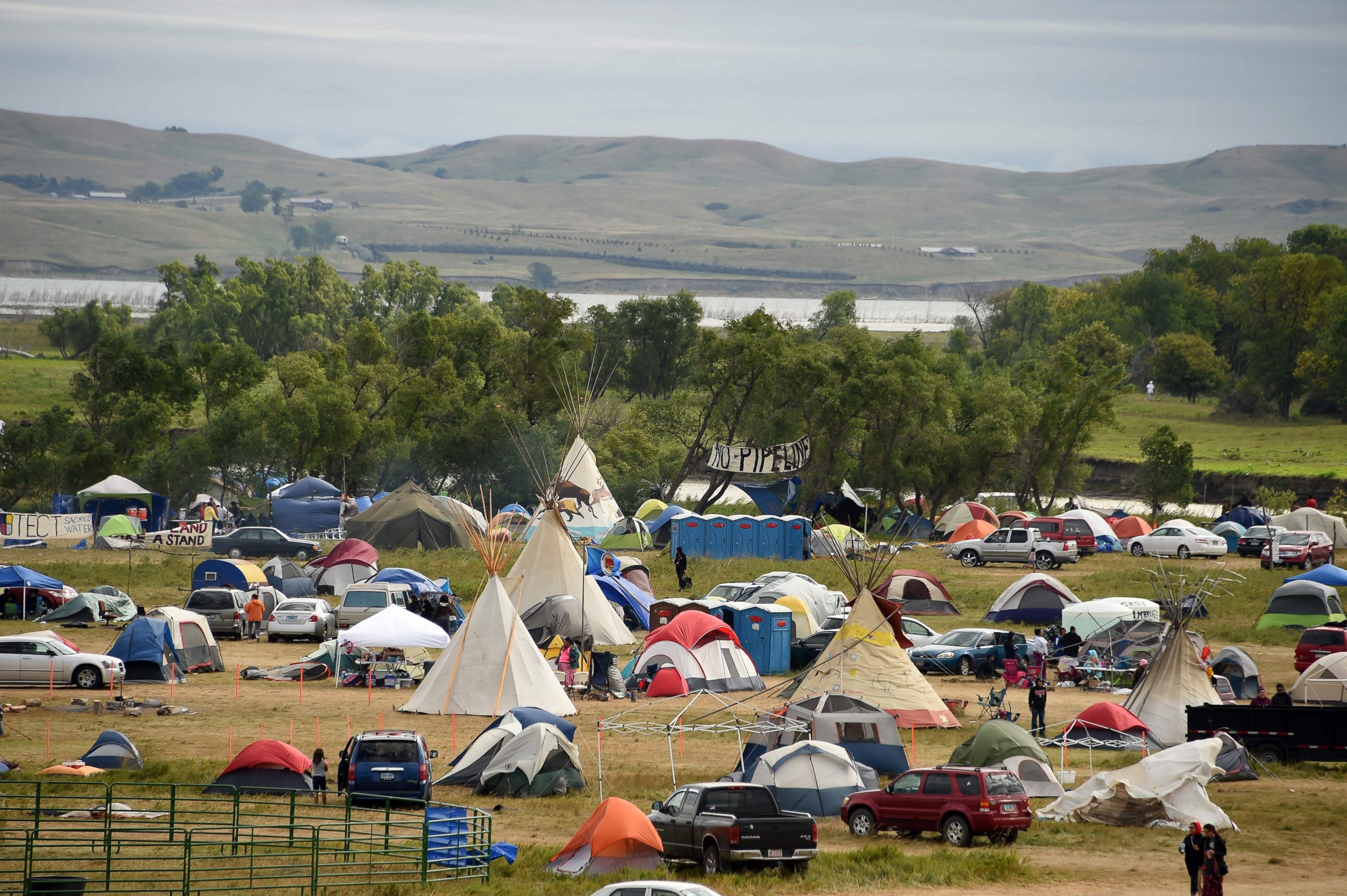
Dakota Access says on its website that it expects the pipeline will transport about 470,000 barrels of oil every day from North Dakota’s Bakken and Three Forks production areas through South Dakota, Iowa and into Illinois, while also creating thousands of construction jobs and generating millions in tax revenue for those four states. "The pipeline will enable domestically produced light sweet crude oil from North Dakota to reach major refining markets in a more direct, cost-effective, safer and environmentally responsible manner," the website says.
But Native American leaders argue they were not adequately consulted regarding the pipeline’s route, and they are concerned for the environmental consequences and the impact on groundwater.
“Native Americans throughout history have been the stewards of the land and we have been warning mainstream America about the destruction that they are doing and that it is not going to last,” Tribal Chairman David Archambault II of the Standing Rock Sioux Tribe told ABC News. "We have to protect the water, we have to protect the earth from destruction.
“What we are concerned about is our future generations, our youth, and what we do today is going to impact them,” Archambault, who spoke to ABC News prior to Saturday's incident, added.
But the Standing Rock Sioux Tribe's problem with the pipeline goes beyond environmental concerns, Archambault said, explaining that the pipeline's route goes through Native American sacred sites.
“Our culture and our spirituality is tied to Mother Earth,” Archambault said. “In order for our kids to have an identity of who they are, our ancestors left significant sites for us," he added, saying that the construction process so far has shown a complete disregard for these culturally and spiritually significant sites.
“It is time that indigenous lands be recognized by the federal government and the corporate world," said Archambault, who emphasized prior to this weekend that the demonstrations against the pipeline have been peaceful. Archambault has not responded to ABC News' request for comment following Saturday's incident.
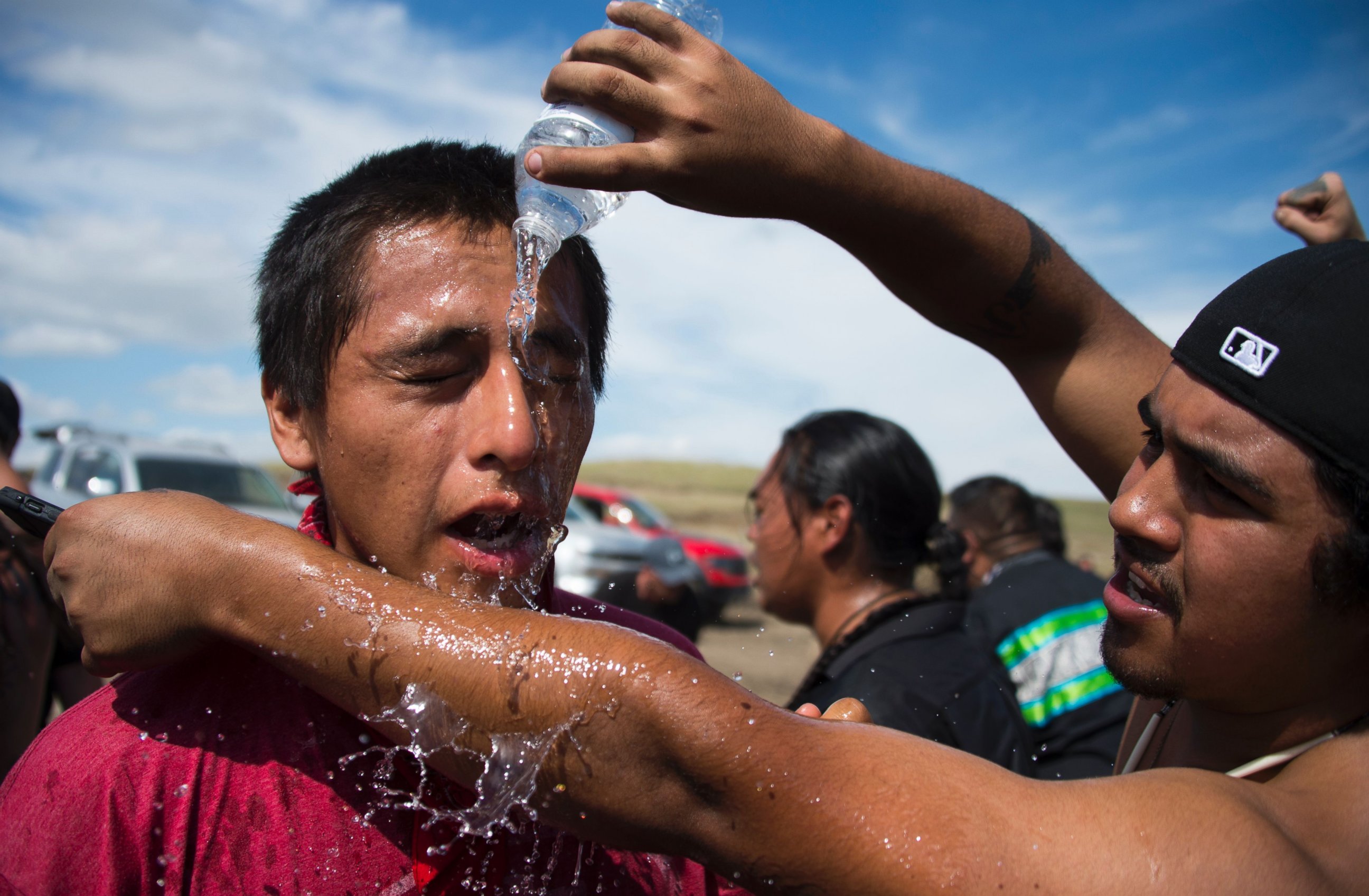
But Donnell Preskey, a spokesperson for the Morton County Sheriff's Department, told ABC News that Saturday's protest was not peaceful.
"The people involved in the protest have been saying that this is a peaceful event. What we’re saying is that what happened on Saturday is in no way a peaceful event. They trespassed," Preskey told ABC News. "There were 300 protesters and only 14 private security officers."
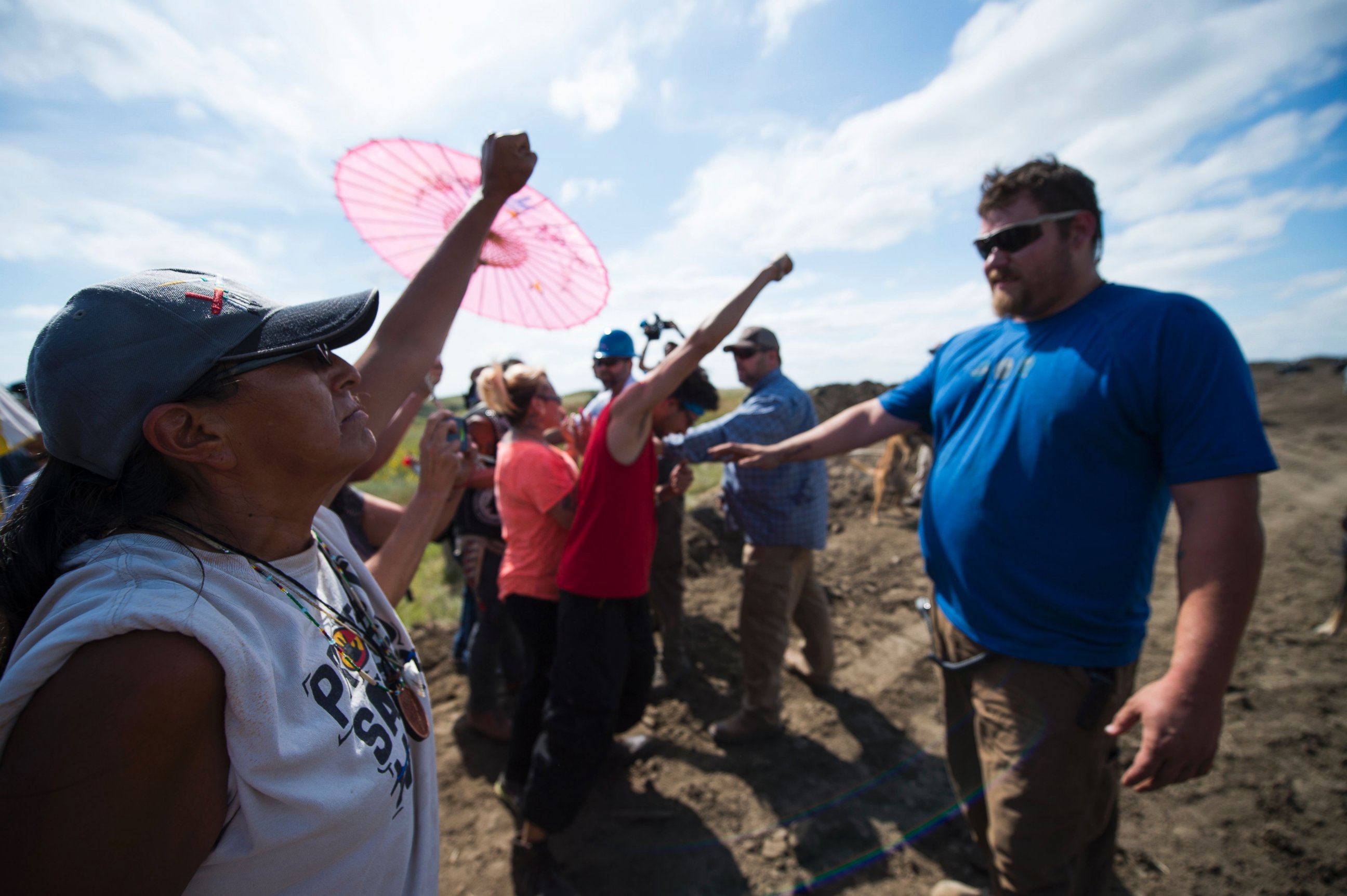
Preskey added that some of the protesters were armed with sticks or flagpoles, and although no arrests have been made, the whole incident is still under investigation.
"Some of the misconceptions that are out there is that the construction is happening on the reservation. It is happening on private landowners' properties and they have given the right to Dakota Access pipeline," Preskey said, adding that the protest has put law enforcement in a difficult situation.
"Dakota Access pipeline has every legal right to be doing the work that they are doing. As law enforcement, our job is to make sure that they can do their work safely and that protesters can protest safely. Law enforcement has been caught in the middle."
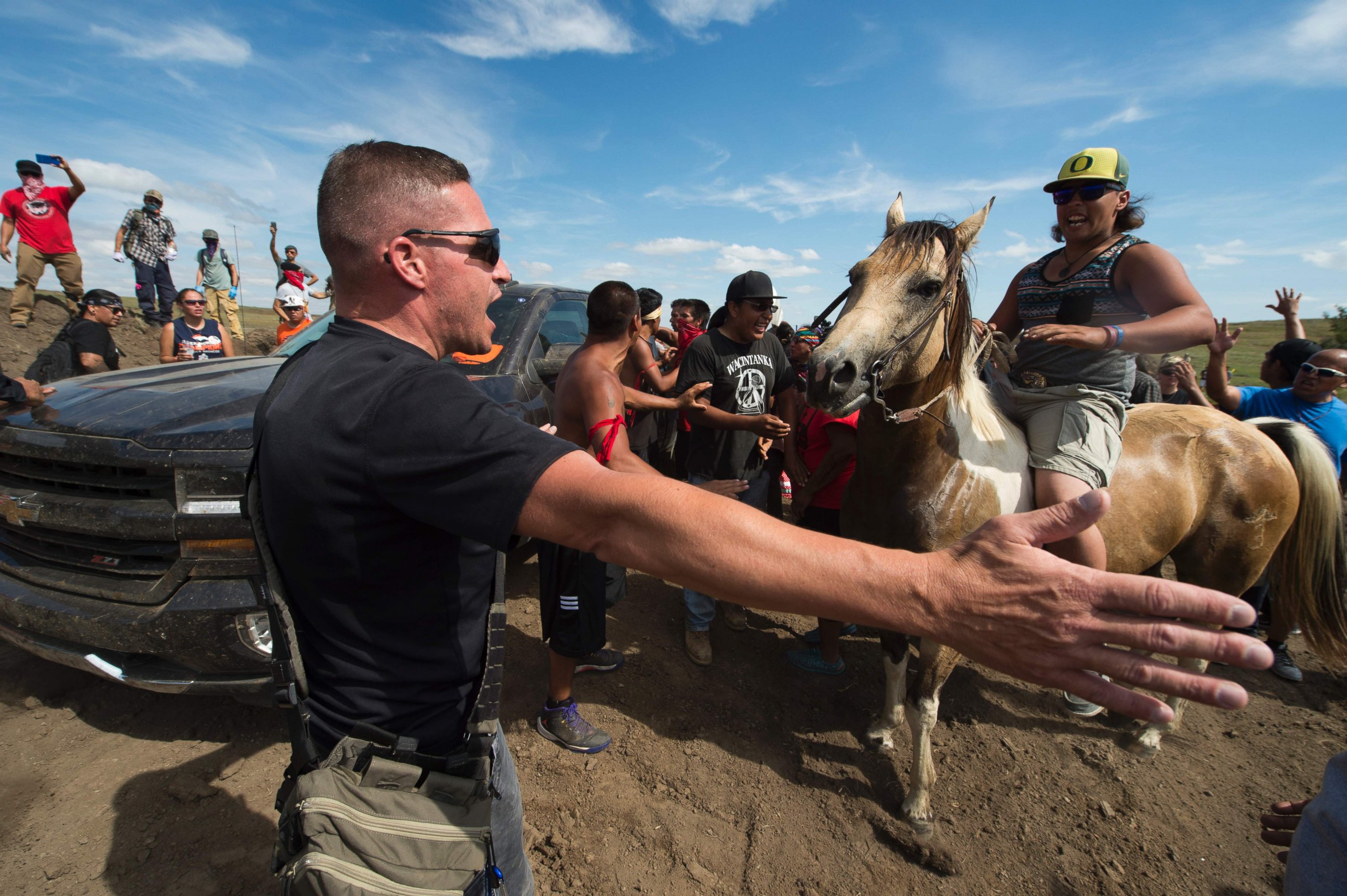
Goldtooth said that the protesters were just trying to prevent a sacred site from getting demolished. "They went and tried to stop the bulldozers," he said. "They went up to the fence with their hands up trying to stop them. ... It was kind of chaotic ... [but] after a while people backed up."
Dakota Access did not respond to ABC News’ request for comment.

Last week, the Standing Rock Sioux Tribe received support from the United Nations Chair of the Permanent Forum on Indigenous Issues Alvaro Pop Ac, and Dalee Dorough and Chief Edward John, members of the Permanent Forum on Indigenous Issues, who said that the tribe's actions may be "misunderstood."
"Thousands of indigenous peoples from different nations have gathered in the Sacred Stone Spirit camp, in North Dakota, to block construction of the pipeline. Actions such as these tend to occur in different parts of the world and are often misunderstood and described as rebellious, backward thinking and unilateral opposition to development," the statement said.
"For indigenous peoples, the environment is a living entity that contains our life sources as well as our sacred sites and heritage. The environment is an important part of our lives and any threats to it impacts our families, ancestors and future generations. It is therefore imperative that the United States respects and recognizes the intrinsic, inter-related rights of Sioux and their spiritual traditions, history, philosophy, and especially their rights to their lands and territories," the U.N. group continued. "The world is watching what is happening in North Dakota."
